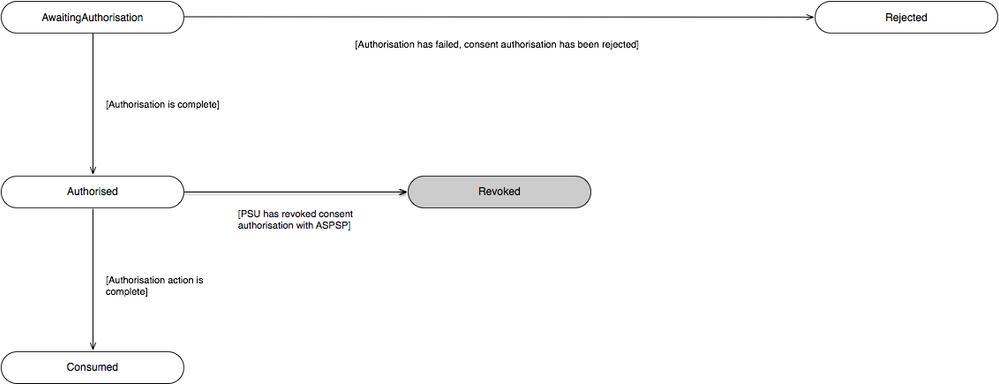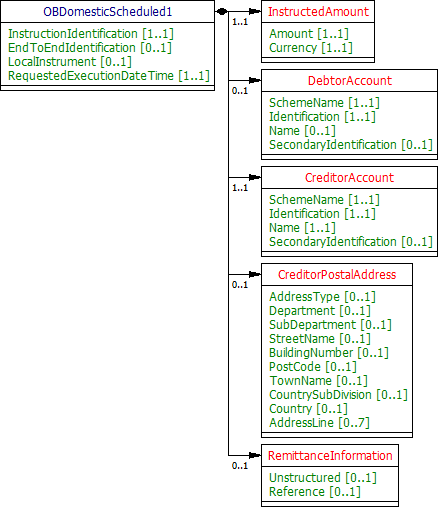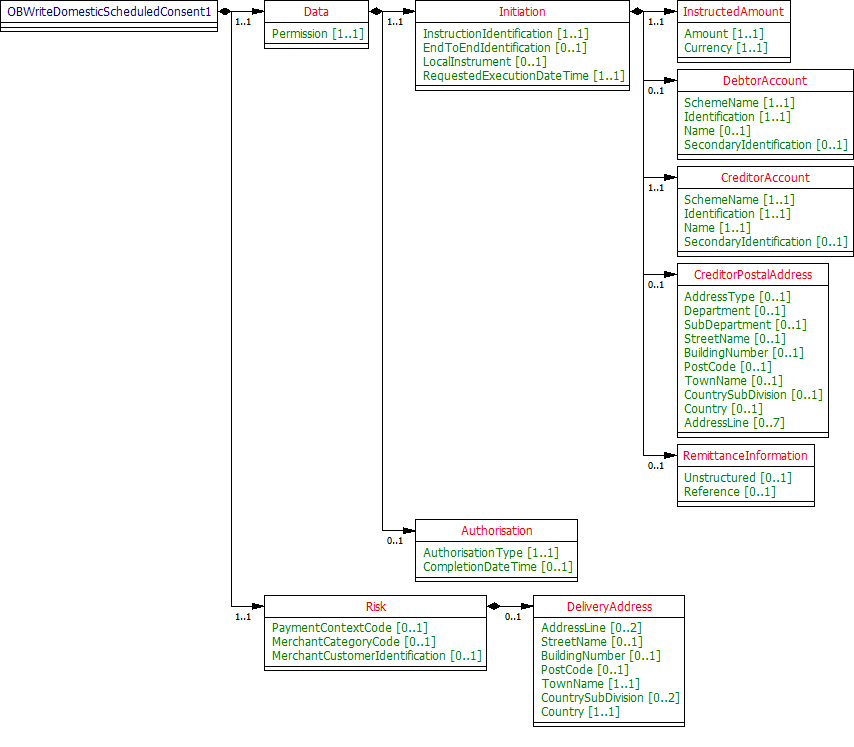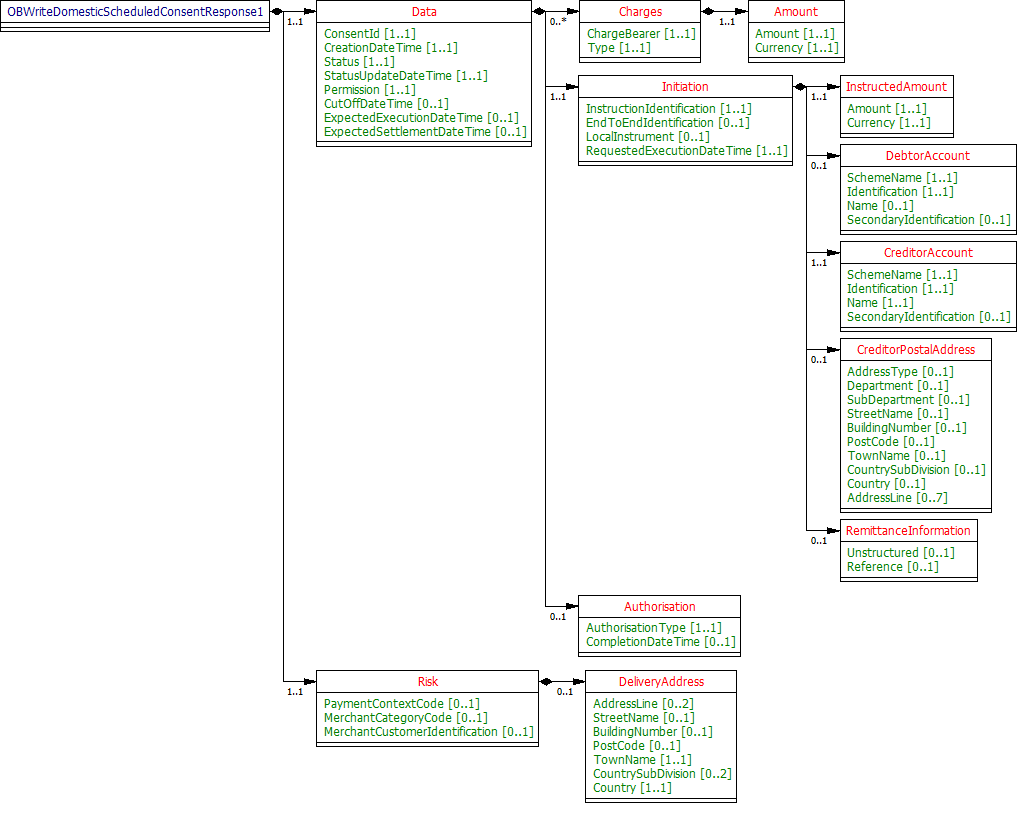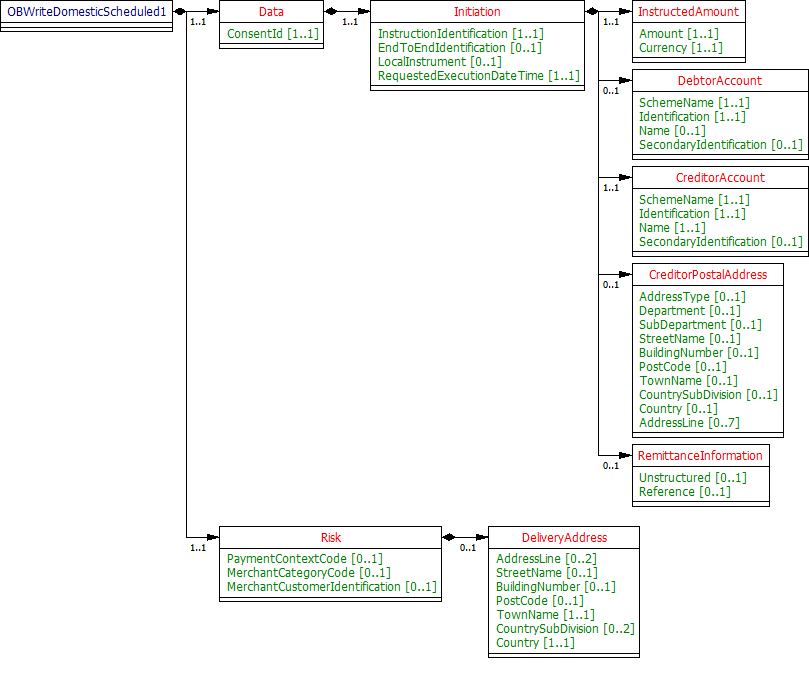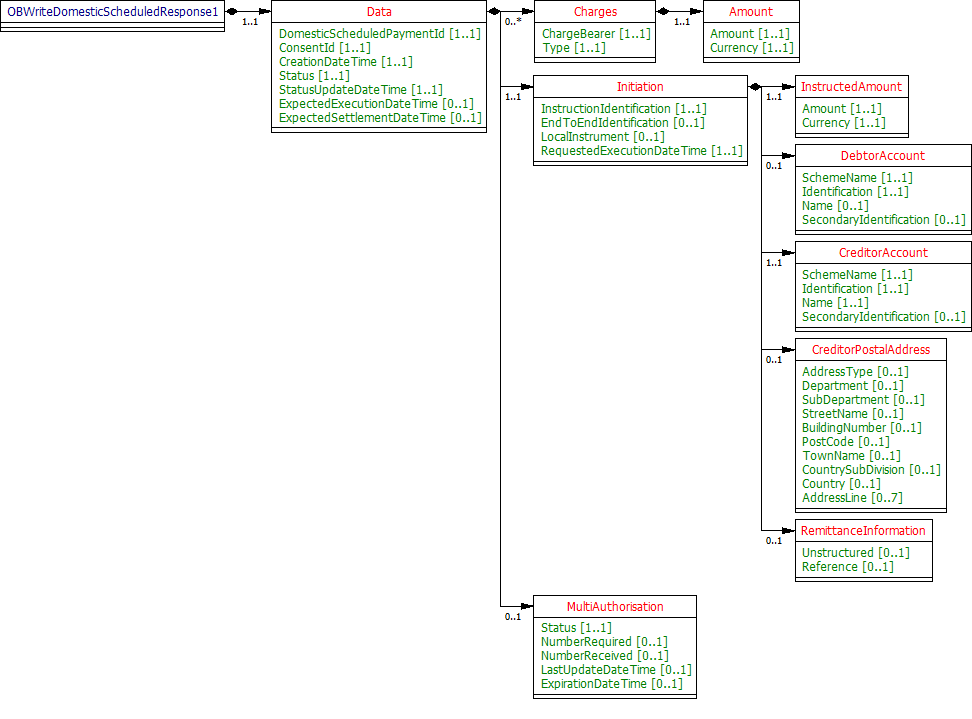Domestic Scheduled Payment v3.0
Version Control
| Version | Date | Author | Comments |
|---|---|---|---|
| 3.0-draft1 | 18-Apr-2018 | OB R/W API Team | First draft of v3 |
| 3.0-draft2 | OB R/W API Team | Changes to the Data Model section. Reused classes for the payment setup request and response objects are documented once:
Payloads for the payment setup request and response have been updated to reflect requirements for P5a and P10. Changes to the request payload for the payment setup object:
Changes to the response payload for the payment setup object:
For internation payments - have removed reference to:
| |
| 3.0-draft3 | OB R/W API Team | Modified title from Scheduled Payments to Domestic Scheduled Payments (and merged Payments and Payment Submissions pages) Draft3 changes:
Changes to Initiation object:
The Initiation object from the domestic-scheduled-payment-consent is now replayed in the response object for the domestic-scheduled-payment Aligned GET operations Mandatory? flag with the equivalent resource POST. | |
| 3.0-draft4 | OB R/W API Team | Draft4 changes: OBDomesticScheduled1 object:
Added re-used class description for:
For the domestic-scheduled-payment-consent response:
For the domestic-scheduled-payment response:
Clarified use of Idempotency Key in endpoint table. | |
| 3.0-draft5 | OB R/W API Team | Draft5 changes:
| |
| 3.0-draft6/rc1 | OB R/W API Team | Draft6 changes:
| |
| 3.0-draft7 | OB R/W API Team | Draft7 Changes:
| |
| 3.0-RC2 | OB R/W API Team | RC2 Changes:
| |
| 3.0-RC3 | OB R/W API Team | No Change | |
| 3.0 | OB R/W API Team | This is the baseline version. No change from RC3. |
Endpoints
| Resource | HTTP Operation | Endpoint | Mandatory ? | Scope | Grant Type | Message Signing | Idempotency Key | Request Object | Response Object |
|---|---|---|---|---|---|---|---|---|---|
| domestic-scheduled-payment-consents | POST | POST /domestic-scheduled-payment-consents | Conditional | payments | Client Credentials | Signed Request Signed Response | Yes | OBWriteDomesticScheduledConsent1 | OBWriteDomesticScheduledConsentResponse1 |
| domestic-scheduled-payment-consents | GET | GET /domestic-scheduled-payment-consents/{ConsentId} | Mandatory (if resource POST implemented) | payments | Client Credentials | Signed Response | No | NA | OBWriteDomesticScheduledConsentResponse1 |
| domestic-scheduled-payments | POST | POST /domestic-scheduled-payments | Conditional | payments | Authorization Code | Signed Request Signed Response | Yes | OBWriteDomesticScheduled1 | OBWriteDomesticScheduledResponse1 |
| domestic-scheduled-payments | GET | GET /domestic-scheduled-payments/{DomesticScheduledPaymentId} | Mandatory (if resource POST implemented) | payments | Client Credentials | Signed Response | No | NA | OBWriteDomesticScheduledResponse1 |
POST /domestic-scheduled-payment-consents
POST /domestic-scheduled-payment-consents
The API endpoint allows the PISP to ask an ASPSP to create a new domestic-scheduled-payment-consent resource.
- The POST action indicates to the ASPSP that a domestic scheduled payment consent has been staged. At this point, the PSU may not have been identified by the ASPSP, and the request payload may not contain any information of the account that should be debited.
- The endpoint allows the PISP to send a copy of the consent (between PSU and PISP) to the ASPSP for the PSU to authorise.
- The ASPSP creates the domestic-scheduled-payment-consent resource and responds with a unique ConsentId to refer to the resource.
Status
The default Status is "AwaitingAuthorisation" immediately after the domestic-scheduled-payment-consent has been created.
| Status |
|---|
| AwaitingAuthorisation |
GET /domestic-scheduled-payment-consents/{ConsentId}
GET /domestic-scheduled-payment-consents/{ConsentId}
A PISP can optionally retrieve a payment consent resource that they have created to check its status.
Status
Once the PSU authorises the payment-consent resource - the Status of the payment-consent resource will be updated with "Authorised".
If the PSU rejects the consent or the domestic-scheduled-payment-consent has failed some other ASPSP validation, the Status will be set to "Rejected".
Once a domestic-scheduled-payment has been successfully created using the domestic-scheduled-payment-consent, the Status of the domestic-scheduled-payment-consent will be set to "Consumed".
The available Status codes for the domestic-scheduled-payment-consent resource are:
| Status |
|---|
| AwaitingAuthorisation |
| Rejected |
| Authorised |
| Consumed |
POST /domestic-scheduled-payments
POST /domestic-scheduled-payments
Once the domestic-scheduled-payment-consent has been authorised by the PSU, the PISP can proceed to submitting the domestic-scheduled-payment for processing:
- This is done by making a POST request to the domestic-scheduled-payments endpoint.
- This request is an instruction to the ASPSP to begin the domestic scheduled payment journey. The PISP must submit the domestic scheduled payment immediately, however, there are some scenarios where the ASPSP may not warehouse the domestic scheduled payment immediately (e.g. busy periods at the ASPSP).
- The PISP must ensure that the Initiation and Risk sections of the domestic-scheduled-payment match the corresponding Initiation and Risk sections of the domestic-scheduled-payment-consent resource. If the two do not match, the ASPSP must not process the request and must respond with a 400 (Bad Request).
- Any operations on the domestic-scheduled-payment resource will not result in a Status change for the domestic-scheduled-payment resource.
Status
A domestic-scheduled-payment can only be created if its corresponding domestic-scheduled-payment-consent resource has the status of "Authorised".
The domestic-scheduled-payment resource that is created successfully must have one of the following Status codes:
| Status |
|---|
| InitiationPending |
| InitiationFailed |
| InitiationCompleted |
GET /domestic-scheduled-payments/{DomesticScheduledPaymentId}
GET /domestic-scheduled-payments/{DomesticScheduledPaymentId}
A PISP can retrieve the domestic-scheduled-payment to check its status.
Status
The domestic-scheduled-payment resource must have one of the following Status codes:
| Status |
|---|
| InitiationPending |
| InitiationFailed |
| InitiationCompleted |
State Model
Payment Order Consent
The state model for the domestic-scheduled-payment-consent resource follows the generic consent state model. However, does not use the "Revoked" status, as the consent for a domestic-scheduled-payment is not a long-lived consent.
The definitions for the Status:
| Status | Status Description | |
|---|---|---|
| 1 | AwaitingAuthorisation | The consent resource is awaiting PSU authorisation. |
| 2 | Rejected | The consent resource has been rejected. |
| 3 | Authorised | The consent resource has been successfully authorised. |
| 4 | Consumed | The consented action has been successfully completed. This does not reflect the status of the consented action. |
Payment Order
The state model for the domestic-scheduled-payment resource describes the initiation status only. I.e., not the subsequent execution of the domestic-scheduled-payment.
The definitions for the Status:
| Status | Payment Status Description | |
|---|---|---|
| 1 | InitiationPending | The initiation of the payment order is pending. |
| 2 | InitiationFailed | The initiation of the payment order has failed. |
| 3 | InitiationCompleted | The initiation of the payment order is complete. |
Multiple Authorisation
If the payment-order requires multiple authorisations - the Status of the multiple authorisations will be updated in the MultiAuthorisation object.
The definitions for the Status:
| Status | Status Description | |
|---|---|---|
| 1 | AwaitingFurtherAuthorisation | The payment-order resource is awaiting further authorisation. |
| 2 | Rejected | The payment-order resource has been rejected by an authoriser. |
| 3 | Authorised | The payment-order resource has been successfully authorised by all required authorisers. |
Data Model
The data dictionary section gives the detail on the payload content for the Domestic Scheduled Payment API flows.
Reused Classes
OBDomesticScheduled1
This section describes the OBDomesticScheduled1 class - which is reused as the Initiation object in the domestic-scheduled-payment-consent and domestic-scheduled-payment resources.
UML Diagram
Notes
For the OBDomesticScheduled1 Initiation object:
All elements in the Initiation payload that are specified by the PISP must not be changed via the ASPSP - as this is part of formal consent from the PSU
If the ASPSP is able to establish a problem with payload or any contextual error during the API call, the ASPSP must reject the domestic-scheduled-payment-consent consent request immediately
If the ASPSP establishes a problem with the domestic-scheduled-payment-consent after the API call, the ASPSP must set the Status of the domestic-scheduled-payment-consent resource to Rejected
- DebtorAccount is optional - as the PISP may not know the account identification details for the PSU.
- If the DebtorAccount is specified by the PISP and is invalid for the PSU - then the domestic-scheduled-payment-consent will be set to Rejected after PSU authentication.
- Account Identification field usage:
- Where "SortCodeAccountNumber" is specified as the SchemeName in the Account identification section (either DebtorAccount or CreditorAccount), the Identification field must be populated with the 6 digit Sort Code and 8 digit Account Number (a 14 digit field).
- Where the "IBAN" is specified as the SchemeName in the Account identification section (either DebtorAccount or CreditorAccount), the Identification field must be populated with the full IBAN.
- Neither the InstructionIdentification nor EndToEndIdentification will be used as the domestic-payment-consent resource identifier (ConsentId) - as the ConsentId must be uniquely generated by the ASPSP.
- Permission field is restricted to "Create" - however, may be extended to "Update" and "Delete" in a future iteration of the specification.
- LocalInstrument is the requested payment scheme for execution. This is a free-text field.
- RequestedExecutionDateTime allows a PISP to specify the date for an ASPSP to execute the domestic scheduled payment.
Data Dictionary
| Name | Occurrence | XPath | EnhancedDefinition | Class | Codes | Pattern |
|---|---|---|---|---|---|---|
| OBDomesticScheduled1 | OBDomesticScheduled1 | The Initiation payload is sent by the initiating party to the ASPSP. It is used to request movement of funds from the debtor account to a creditor for a single scheduled domestic payment. | OBDomesticScheduled1 | |||
| InstructionIdentification | 1..1 | OBDomesticScheduled1/InstructionIdentification | Unique identification as assigned by an instructing party for an instructed party to unambiguously identify the instruction. Usage: the instruction identification is a point to point reference that can be used between the instructing party and the instructed party to refer to the individual instruction. It can be included in several messages related to the instruction. | Max35Text | ||
| EndToEndIdentification | 0..1 | OBDomesticScheduled1/EndToEndIdentification | Unique identification assigned by the initiating party to unambiguously identify the transaction. This identification is passed on, unchanged, throughout the entire end-to-end chain. Usage: The end-to-end identification can be used for reconciliation or to link tasks relating to the transaction. It can be included in several messages related to the transaction. OB: The Faster Payments Scheme can only access 31 characters for the EndToEndIdentification field. | Max35Text | ||
| LocalInstrument | 0..1 | OBDomesticScheduled1/LocalInstrument | User community specific instrument. Usage: This element is used to specify a local instrument, local clearing option and/or further qualify the service or service level. | Max35Text | ||
| RequestedExecutionDateTime | 1..1 | OBDomesticScheduled1/RequestedExecutionDateTime | Date at which the initiating party requests the clearing agent to process the payment. Usage: This is the date on which the debtor's account is to be debited. | ISODateTime | ||
| InstructedAmount | 1..1 | OBDomesticScheduled1/InstructedAmount | Amount of money to be moved between the debtor and creditor, before deduction of charges, expressed in the currency as ordered by the initiating party. Usage: This amount has to be transported unchanged through the transaction chain. | OBActiveOrHistoricCurrencyAndAmount | ||
| Amount | 1..1 | OBDomesticScheduled1/InstructedAmount/Amount | A number of monetary units specified in an active currency where the unit of currency is explicit and compliant with ISO 4217. | ActiveCurrencyAndAmount_SimpleType | ||
| Currency | 1..1 | OBDomesticScheduled1/InstructedAmount/Currency | A code allocated to a currency by a Maintenance Agency under an international identification scheme, as described in the latest edition of the international standard ISO 4217 "Codes for the representation of currencies and funds". | ActiveOrHistoricCurrencyCode | ^[A-Z]{3,3}$ | |
| DebtorAccount | 0..1 | OBDomesticScheduled1/DebtorAccount | Unambiguous identification of the account of the debtor to which a debit entry will be made as a result of the transaction. | OBCashAccountDebtor3 | ||
| SchemeName | 1..1 | OBDomesticScheduled1/DebtorAccount/SchemeName | Name of the identification scheme, in a coded form as published in an external list. | Max40Text | ||
| Identification | 1..1 | OBDomesticScheduled1/DebtorAccount/Identification | Identification assigned by an institution to identify an account. This identification is known by the account owner. | Max256Text | ||
| Name | 0..1 | OBDomesticScheduled1/DebtorAccount/Name | Name of the account, as assigned by the account servicing institution. Usage: The account name is the name or names of the account owner(s) represented at an account level. The account name is not the product name or the nickname of the account. | Max70Text | ||
| SecondaryIdentification | 0..1 | OBDomesticScheduled1/DebtorAccount/SecondaryIdentification | This is secondary identification of the account, as assigned by the account servicing institution. This can be used by building societies to additionally identify accounts with a roll number (in addition to a sort code and account number combination). | Max34Text | ||
| CreditorAccount | 1..1 | OBDomesticScheduled1/CreditorAccount | Unambiguous identification of the account of the creditor to which a credit entry will be posted as a result of the payment transaction. | OBCashAccountCreditor2 | ||
| SchemeName | 1..1 | OBDomesticScheduled1/CreditorAccount/SchemeName | Name of the identification scheme, in a coded form as published in an external list. | Max40Text | ||
| Identification | 1..1 | OBDomesticScheduled1/CreditorAccount/Identification | Identification assigned by an institution to identify an account. This identification is known by the account owner. | Max256Text | ||
| Name | 1..1 | OBDomesticScheduled1/CreditorAccount/Name | Name of the account, as assigned by the account servicing institution. Usage: The account name is the name or names of the account owner(s) represented at an account level. The account name is not the product name or the nickname of the account. OB: ASPSPs may carry out name validation for Confirmation of Payee, but it is not mandatory. | Max70Text | ||
| SecondaryIdentification | 0..1 | OBDomesticScheduled1/CreditorAccount/SecondaryIdentification | This is secondary identification of the account, as assigned by the account servicing institution. This can be used by building societies to additionally identify accounts with a roll number (in addition to a sort code and account number combination). | Max34Text | ||
| CreditorPostalAddress | 0..1 | OBDomesticScheduled1/CreditorPostalAddress | Information that locates and identifies a specific address, as defined by postal services. | OBPostalAddress6 | ||
| AddressType | 0..1 | OBDomesticScheduled1/CreditorPostalAddress/AddressType | Identifies the nature of the postal address. | OBAddressTypeCode | Business Correspondence DeliveryTo MailTo POBox Postal Residential Statement | |
| Department | 0..1 | OBDomesticScheduled1/CreditorPostalAddress/Department | Identification of a division of a large organisation or building. | Max70Text | ||
| SubDepartment | 0..1 | OBDomesticScheduled1/CreditorPostalAddress/SubDepartment | Identification of a sub-division of a large organisation or building. | Max70Text | ||
| StreetName | 0..1 | OBDomesticScheduled1/CreditorPostalAddress/StreetName | Name of a street or thoroughfare. | Max70Text | ||
| BuildingNumber | 0..1 | OBDomesticScheduled1/CreditorPostalAddress/BuildingNumber | Number that identifies the position of a building on a street. | Max16Text | ||
| PostCode | 0..1 | OBDomesticScheduled1/CreditorPostalAddress/PostCode | Identifier consisting of a group of letters and/or numbers that is added to a postal address to assist the sorting of mail. | Max16Text | ||
| TownName | 0..1 | OBDomesticScheduled1/CreditorPostalAddress/TownName | Name of a built-up area, with defined boundaries, and a local government. | Max35Text | ||
| CountrySubDivision | 0..1 | OBDomesticScheduled1/CreditorPostalAddress/CountrySubDivision | Identifies a subdivision of a country such as state, region, county. | Max35Text | ||
| Country | 0..1 | OBDomesticScheduled1/CreditorPostalAddress/Country | Nation with its own government. | CountryCode | ^[A-Z]{2,2}$ | |
| AddressLine | 0..7 | OBDomesticScheduled1/CreditorPostalAddress/AddressLine | Information that locates and identifies a specific address, as defined by postal services, presented in free format text. | Max70Text | ||
| RemittanceInformation | 0..1 | OBDomesticScheduled1/RemittanceInformation | Information supplied to enable the matching of an entry with the items that the transfer is intended to settle, such as commercial invoices in an accounts' receivable system. | OBRemittanceInformation1 | ||
| Unstructured | 0..1 | OBDomesticScheduled1/RemittanceInformation/Unstructured | Information supplied to enable the matching/reconciliation of an entry with the items that the payment is intended to settle, such as commercial invoices in an accounts' receivable system, in an unstructured form. | Max140Text | ||
| Reference | 0..1 | OBDomesticScheduled1/RemittanceInformation/Reference | Unique reference, as assigned by the creditor, to unambiguously refer to the payment transaction. Usage: If available, the initiating party should provide this reference in the structured remittance information, to enable reconciliation by the creditor upon receipt of the amount of money. If the business context requires the use of a creditor reference or a payment remit identification, and only one identifier can be passed through the end-to-end chain, the creditor's reference or payment remittance identification should be quoted in the end-to-end transaction identification. OB: The Faster Payments Scheme can only accept 18 characters for the ReferenceInformation field - which is where this ISO field will be mapped. | Max35Text |
Domestic Scheduled Payment Consent - Request
The OBWriteDomesticScheduledConsent1 object will be used for the call to:
- POST /domestic-scheduled-payment-consents
UML Diagram
Notes
The domestic-scheduled-payment-consent request contains these objects:
- Initiation
- Authorisation
- Risk
Data Dictionary
| Name | Occurrence | XPath | EnhancedDefinition | Class | Codes | Pattern |
|---|---|---|---|---|---|---|
| OBWriteDomesticScheduledConsent1 | OBWriteDomesticScheduledConsent1 | OBWriteDomesticScheduledConsent1 | ||||
| Data | 1..1 | OBWriteDomesticScheduledConsent1/Data | OBWriteDataDomesticScheduledConsent1 | |||
| Permission | 1..1 | OBWriteDomesticScheduledConsent1/Data/Permission | Specifies the Open Banking service request types. | OBExternalPermissions2Code | Create | |
| Initiation | 1..1 | OBWriteDomesticScheduledConsent1/Data/Initiation | The Initiation payload is sent by the initiating party to the ASPSP. It is used to request movement of funds from the debtor account to a creditor for a single scheduled domestic payment. | OBDomesticScheduled1 | ||
| Authorisation | 0..1 | OBWriteDomesticScheduledConsent1/Data/Authorisation | Type of authorisation flow requested. | OBAuthorisation1 | ||
| Risk | 1..1 | OBWriteDomesticScheduledConsent1/Risk | The Risk section is sent by the initiating party to the ASPSP. It is used to specify additional details for risk scoring for Payments. | OBRisk1 |
Domestic Scheduled Payment Consent - Response
The OBWriteDomesticScheduledConsentResponse1 object will be used for a response to a call to:
- POST /domestic-scheduled-payment-consents
- GET /domestic-scheduled-payment-consents/{ConsentId}
UML Diagram
Notes
The domestic-scheduled-payment-consent response contains the full original payload from the domestic-scheduled-payment-consent request - with these additional elements:
- ConsentId
- CreationDateTime the domestic-scheduled-payment-consent resource was created
- Status and StatusUpdateDateTime of the domestic-scheduled-payment-consent resource
- Permission field in the original request
- CutOffDateTime Behaviour is explained in Payment Initiation API Specification, Section - Payment Restrictions -> CutOffDateTime API Behaviour
- ExpectedExecutionDateTime for the domestic-scheduled-payment resource if created before CutOffDateTIme - the expected DateTime the payment is executed against the Debtor Account. If populated, the ASPSP must update the value with any changes (e.g., after PSU authorisation).
- ExpectedSettlementDateTime for the domestic-scheduled-payment resource if created before CutOffDateTIme - the expected DateTime the payment will be received at the Creditor Account. If populated, the ASPSP must update the value with any changes (e.g., after PSU authorisation).
- Charges array - for the breakdown of applicable ASPSP charges
Data Dictionary
| Name | Occurrence | XPath | EnhancedDefinition | Class | Codes | Pattern |
|---|---|---|---|---|---|---|
| OBWriteDomesticScheduledConsentResponse1 | OBWriteDomesticScheduledConsentResponse1 | OBWriteDomesticScheduledConsentResponse1 | ||||
| Data | 1..1 | OBWriteDomesticScheduledConsentResponse1/Data | OBWriteDataDomesticScheduledConsentResponse1 | |||
| ConsentId | 1..1 | OBWriteDomesticScheduledConsentResponse1/Data/ConsentId | OB: Unique identification as assigned by the ASPSP to uniquely identify the consent resource. | Max128Text | ||
| CreationDateTime | 1..1 | OBWriteDomesticScheduledConsentResponse1/Data/CreationDateTime | Date and time at which the resource was created. | ISODateTime | ||
| Status | 1..1 | OBWriteDomesticScheduledConsentResponse1/Data/Status | Specifies the status of consent resource in code form. | OBExternalConsentStatus1Code | Authorised AwaitingAuthorisation Consumed Rejected | |
| StatusUpdateDateTime | 1..1 | OBWriteDomesticScheduledConsentResponse1/Data/StatusUpdateDateTime | Date and time at which the consent resource status was updated. | ISODateTime | ||
| Permission | 1..1 | OBWriteDomesticScheduledConsentResponse1/Data/Permission | Specifies the Open Banking service request types. | OBExternalPermissions2Code | Create | |
| CutOffDateTime | 0..1 | OBWriteDomesticScheduledConsentResponse1/Data/CutOffDateTime | Specified cut-off date and time for the payment consent. | ISODateTime | ||
| ExpectedExecutionDateTime | 0..1 | OBWriteDomesticScheduledConsentResponse1/Data/ExpectedExecutionDateTime | Expected execution date and time for the payment resource. | ISODateTime | ||
| ExpectedSettlementDateTime | 0..1 | OBWriteDomesticScheduledConsentResponse1/Data/ExpectedSettlementDateTime | Expected settlement date and time for the payment resource. | ISODateTime | ||
| Charges | 0..n | OBWriteDomesticScheduledConsentResponse1/Data/Charges | Set of elements used to provide details of a charge for the payment initiation. | OBCharge1 | ||
| Initiation | 1..1 | OBWriteDomesticScheduledConsentResponse1/Data/Initiation | The Initiation payload is sent by the initiating party to the ASPSP. It is used to request movement of funds from the debtor account to a creditor for a single scheduled domestic payment. | OBDomesticScheduled1 | ||
| Authorisation | 0..1 | OBWriteDomesticScheduledConsentResponse1/Data/Authorisation | Type of authorisation flow requested. | OBAuthorisation1 | ||
| Risk | 1..1 | OBWriteDomesticScheduledConsentResponse1/Risk | The Risk section is sent by the initiating party to the ASPSP. It is used to specify additional details for risk scoring for Payments. | OBRisk1 |
Domestic Scheduled Payment - Request
The OBWriteDomesticScheduled1 object will be used for a call to:
- POST /domestic-scheduled-payments
UML Diagram
Notes
The domestic-scheduled-payment request object contains the:
- ConsentId
- The full Initiation and Risk objects from the domestic-scheduled-payment-consent request
The Initiation and Risk sections of the domestic-scheduled-payment request must match the Initiation and Risk sections of the corresponding domestic-scheduled-payment-consent request.
Data Dictionary
| Name | Occurrence | XPath | EnhancedDefinition | Class | Codes | Pattern |
|---|---|---|---|---|---|---|
| OBWriteDomesticScheduled1 | OBWriteDomesticScheduled1 | OBWriteDomesticScheduled1 | ||||
| Data | 1..1 | OBWriteDomesticScheduled1/Data | OBWriteDataDomesticScheduled1 | |||
| ConsentId | 1..1 | OBWriteDomesticScheduled1/Data/ConsentId | OB: Unique identification as assigned by the ASPSP to uniquely identify the consent resource. | Max128Text | ||
| Initiation | 1..1 | OBWriteDomesticScheduled1/Data/Initiation | The Initiation payload is sent by the initiating party to the ASPSP. It is used to request movement of funds from the debtor account to a creditor for a single scheduled domestic payment. | OBDomesticScheduled1 | ||
| Risk | 1..1 | OBWriteDomesticScheduled1/Risk | The Risk section is sent by the initiating party to the ASPSP. It is used to specify additional details for risk scoring for Payments. | OBRisk1 |
Domestic Scheduled Payment - Response
The OBWriteDomesticScheduledResponse1 object will be used for a response to a call to:
- POST /domestic-scheduled-payments
- GET /domestic-scheduled-payments/{DomesticScheduledPaymentId}
UML Diagram
Notes
The domestic-scheduled-payment response object contains the:
- DomesticScheduledPaymentId
- ConsentId
- CreationDateTime the domestic-scheduled-payment resource was created
- Status and StatusUpdateDateTime of the domestic-scheduled-payment resource
- ExpectedExecutionDateTime for the domestic-scheduled-payment resource
- ExpectedSettlementDateTime for the domestic-scheduled-payment resource
- Charges array - for the breakdown of applicable ASPSP charges
- The Initiation object from the domestic-scheduled-payment-consent
- The MultiAuthorisation object if the domestic-scheduled-payment resource requires multiple authorisations
Data Dictionary
| Name | Occurrence | XPath | EnhancedDefinition | Class | Codes | Pattern |
|---|---|---|---|---|---|---|
| OBWriteDomesticScheduledResponse1 | OBWriteDomesticScheduledResponse1 | OBWriteDomesticScheduledResponse1 | ||||
| Data | 1..1 | OBWriteDomesticScheduledResponse1/Data | OBWriteDataDomesticScheduledResponse1 | |||
| DomesticScheduledPaymentId | 1..1 | OBWriteDomesticScheduledResponse1/Data/DomesticScheduledPaymentId | OB: Unique identification as assigned by the ASPSP to uniquely identify the domestic schedule payment resource. | Max40Text | ||
| ConsentId | 1..1 | OBWriteDomesticScheduledResponse1/Data/ConsentId | OB: Unique identification as assigned by the ASPSP to uniquely identify the consent resource. | Max128Text | ||
| CreationDateTime | 1..1 | OBWriteDomesticScheduledResponse1/Data/CreationDateTime | Date and time at which the message was created. | ISODateTime | ||
| Status | 1..1 | OBWriteDomesticScheduledResponse1/Data/Status | Specifies the status of the payment order resource. | OBExternalStatus1Code | InitiationCompleted InitiationFailed InitiationPending | |
| StatusUpdateDateTime | 1..1 | OBWriteDomesticScheduledResponse1/Data/StatusUpdateDateTime | Date and time at which the resource status was updated. | ISODateTime | ||
| ExpectedExecutionDateTime | 0..1 | OBWriteDomesticScheduledResponse1/Data/ExpectedExecutionDateTime | Expected execution date and time for the payment resource. | ISODateTime | ||
| ExpectedSettlementDateTime | 0..1 | OBWriteDomesticScheduledResponse1/Data/ExpectedSettlementDateTime | Expected settlement date and time for the payment resource. | ISODateTime | ||
| Charges | 0..n | OBWriteDomesticScheduledResponse1/Data/Charges | Set of elements used to provide details of a charge for the payment initiation. | OBCharge1 | ||
| Initiation | 1..1 | OBWriteDomesticScheduledResponse1/Data/Initiation | The Initiation payload is sent by the initiating party to the ASPSP. It is used to request movement of funds from the debtor account to a creditor for a single scheduled domestic payment. | OBDomesticScheduled1 | ||
| MultiAuthorisation | 0..1 | OBWriteDomesticScheduledResponse1/Data/MultiAuthorisation | The multiple authorisation flow response from the ASPSP. | OBMultiAuthorisation1 |
Usage Examples
Create a Domestic Scheduled Payment Consent
POST /domestic-scheduled-payment-consents Request
POST /domestic-scheduled-payment-consents HTTP/1.1
Authorization: Bearer 2YotnFZFEjr1zCsicMWpAA
x-idempotency-key: FRESCO.21302.GFX.20
x-jws-signature: TGlmZSdzIGEgam91cm5leSBub3QgYSBkZXN0aW5hdGlvbiA=..T2ggZ29vZCBldmVuaW5nIG1yIHR5bGVyIGdvaW5nIGRvd24gPw==
x-fapi-financial-id: OB/2017/001
x-fapi-customer-last-logged-time: Sun, 10 Sep 2017 19:43:31 GMT
x-fapi-customer-ip-address: 104.25.212.99
x-fapi-interaction-id: 93bac548-d2de-4546-b106-880a5018460d
Content-Type: application/json
Accept: application/json
{
"Data": {
"Permission":"Create",
"Initiation": {
"RequestedExecutionDate": "2018-08-06T00:00:00+00:00",
"InstructedAmount": {
"Amount": "200.00",
"Currency": "GBP"
},
"DebtorAccount": {
"SchemeName": "UK.OBIE.SortCodeAccountNumber",
"Identification": "11280001234567",
"Name": "Andrea Frost"
},
"CreditorAccount": {
"SchemeName": "UK.OBIE.SortCodeAccountNumber",
"Identification": "08080021325698",
"Name": "Tom Kirkman"
},
"RemittanceInformation": {
"Reference": "DSR-037",
"Unstructured": "Internal ops code 5120103"
}
}
},
"Risk": {
"PaymentContextCode": "PartyToParty"
}
}
POST /domestic-scheduled-payment-consents Response
HTTP/1.1 201 Created
x-jws-signature: V2hhdCB3ZSBnb3QgaGVyZQ0K..aXMgZmFpbHVyZSB0byBjb21tdW5pY2F0ZQ0K
x-fapi-interaction-id: 93bac548-d2de-4546-b106-880a5018460d
Content-Type: application/json
{
"Data": {
"ConsentId": "7290",
"Permission": "Create",
"Status": "AwaitingAuthorisation",
"CreationDateTime": "2018-05-05T15:15:13+00:00",
"StatusUpdateDateTime": "2018-05-05T15:15:13+00:00",
"Initiation": {
"RequestedExecutionDate": "2018-08-06T00:00:00+00:00",
"InstructedAmount": {
"Amount": "200.00",
"Currency": "GBP"
},
"DebtorAccount": {
"SchemeName": "UK.OBIE.SortCodeAccountNumber",
"Identification": "11280001234567",
"Name": "Andrea Frost"
},
"CreditorAccount": {
"SchemeName": "UK.OBIE.SortCodeAccountNumber",
"Identification": "08080021325698",
"Name": "Tom Kirkman"
},
"RemittanceInformation": {
"Reference": "DSR-037",
"Unstructured": "Internal ops code 5120103"
}
}
},
"Risk": {
"PaymentContextCode": "PartyToParty"
},
"Links": {
"Self": "https://api.alphabank.com/open-banking/v3.0/domestic-scheduled-payment-consents/7290"
},
"Meta": {}
}
Create a Domestic Scheduled Payment
POST /domestic-scheduled-payments Request
POST /domestic-scheduled-payments HTTP/1.1
Authorization: Bearer 2YotnFZFEjr1zCsicMWpAA
x-idempotency-key: FRESNO.1317.GFX.22
x-jws-signature: TGlmZSdzIGEgam91cm5leSBub3QgYSBkZXN0aW5hdGlvbiA=..T2ggZ29vZCBldmVuaW5nIG1yIHR5bGVyIGdvaW5nIGRvd24gPw==
x-fapi-financial-id: OB/2017/001
x-fapi-customer-last-logged-time: Sun, 10 Sep 2017 19:43:31 GMT
x-fapi-customer-ip-address: 104.25.212.99
x-fapi-interaction-id: 93bac548-d2de-4546-b106-880a5018460d
Content-Type: application/json
Accept: application/json
{
"Data": {
"ConsentId": "7290",
"Initiation": {
"RequestedExecutionDate": "2018-08-06T00:00:00+00:00",
"InstructedAmount": {
"Amount": "200.00",
"Currency": "GBP"
},
"DebtorAccount": {
"SchemeName": "UK.OBIE.SortCodeAccountNumber",
"Identification": "11280001234567",
"Name": "Andrea Frost"
},
"CreditorAccount": {
"SchemeName": "UK.OBIE.SortCodeAccountNumber",
"Identification": "08080021325698",
"Name": "Tom Kirkman"
},
"RemittanceInformation": {
"Reference": "DSR-037",
"Unstructured": "Internal ops code 5120103"
}
}
},
"Risk": {
"PaymentContextCode": "PartyToParty"
}
}
POST /domestic-scheduled-payments Response
HTTP/1.1 201 Created
x-jws-signature: V2hhdCB3ZSBnb3QgaGVyZQ0K..aXMgZmFpbHVyZSB0byBjb21tdW5pY2F0ZQ0K
x-fapi-interaction-id: 93bac548-d2de-4546-b106-880a5018460d
Content-Type: application/json
{
"Data": {
"DomesticScheduledPaymentId": "7290-003",
"ConsentId": "7290",
"Status": "InitiationPending",
"CreationDateTime": "2018-05-05T15:15:13+00:00",
"StatusUpdateDateTime": "2018-05-05T15:15:13+00:00",
"Initiation": {
"RequestedExecutionDate": "2018-08-06T00:00:00+00:00",
"InstructedAmount": {
"Amount": "200.00",
"Currency": "GBP"
},
"DebtorAccount": {
"SchemeName": "UK.OBIE.SortCodeAccountNumber",
"Identification": "11280001234567",
"Name": "Andrea Frost"
},
"CreditorAccount": {
"SchemeName": "UK.OBIE.SortCodeAccountNumber",
"Identification": "08080021325698",
"Name": "Tom Kirkman"
},
"RemittanceInformation": {
"Reference": "DSR-037",
"Unstructured": "Internal ops code 5120103"
}
}
},
"Links": {
"Self": "https://api.alphabank.com/open-banking/v3.0/domestic-scheduled-payments/7290-003"
},
"Meta": {}
}
© Open Banking Limited 2019 | https://www.openbanking.org.uk/open-licence | https://www.openbanking.org.uk
